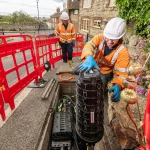Improved Mobile Planning Rules and £30m for UK Rural 5G Trials
The UK Government has commitment another £30m to help up to 10 rural locations conduct “innovative trials” of 5G mobile / mobile broadband applications as part of a new Rural Connected Communities (RCC) project, which could stimulate commercial investment. On top of that they aim to ease mobile planning rules.
The new investment is intended to build on last year’s £25m commitment toward Phase One of the initial 5G Testbeds and Trials project (here). The RCC was first hinted at last year, when the Government said that it would be designed to “promote demand for services from consumers, enterprises and the public sector in rural areas and will also explore how ”neutral host” infrastructure sharing and spectrum sharing can be used to improve the incentives to invest.”
On top of this the Government will today launch a new consultation on proposals to simplify the planning rules (Permitted Development Rights) in order to improve rural mobile coverage (England only). Reforming planning laws for mobile infrastructure is said to be part of the Prime Minister’s plan to level-up connectivity for communities across the UK and support the rollout of 5G.
Advertisement
Strictly speaking all this has been in development since well before Boris Johnson was appointed.
Key Points of the Planning Consultation
The consultation on potential changes to permitted development rights for mobile infrastructure in England includes proposals on:
* changing the permitted height of new masts to deliver better mobile coverage, promote mast sharing and minimise the need to build more infrastructure;
* allowing existing ground-based masts to be strengthened without prior approval to enable sites to be upgraded for 5G and for mast sharing;
* deploying radio equipment cabinets on protected and unprotected land without prior approval, excluding sites of special scientific interest; and
* allowing building-based masts nearer to roads to support 5G and increase mobile coverage.
At present 25 metres (height) is currently the legal limit in England (it’s even lower in some parts of the UK, such as Wales), but outside of urban areas mobile operators would also like to build even taller masts because this is one way to significantly boost coverage, while keeping costs down. Around the EU a lot of countries have a 50m limit and 25m also seems increasingly redundant in the era of towering wind turbines.
Before the usual mobile health fears start, taller masts actually put the radio equipment even further away from people on the ground (safer). Likewise having taller masts means that you need fewer small masts, which is another bonus on this front. Secondary legislation would be required in order to implement any proposed changes to the planning regulations.
The Government said that it would also seek to encourage “maximum utilisation of existing sites and buildings, before new sites are developed, including enabling greater sharing of infrastructure” and all of this must somehow be balanced against the need to ensure that “appropriate environmental protections are in place” (easier said than done as both people and landowners can be very vocal about such things).
Advertisement
The Government added that it is also seeking views on what measures industry could offer to mitigate the impact of any new infrastructure, including assurances of a greater use of existing sites and the removal of redundant masts.
Nicky Morgan MP, UK Digital Secretary, said:
“The British countryside has always been a hotbed of pioneering industries and we’re making sure our rural communities aren’t left behind in the digital age.
We’re investing millions so the whole country can grasp the opportunities and economic benefits of next generation 5G technology.
In modern Britain people expect to be connected wherever they are. And so we’re committed to securing widespread mobile coverage and must make sure we have the right planning laws to give the UK the best infrastructure to stay ahead.”
Esther McVey MP, Minister of State for Housing and Planning, said:
“We’re committed to delivering the homes people across the country need, and that includes delivering the right infrastructure such as broadband connectivity and good mobile coverage. There is nothing more frustrating than moving into your new home to find signal is poor.
That’s why we are proposing to simplify planning rules for installing the latest mobile technology – helping to extend coverage and banish more of those signal blackspots, particularly for those living in rural areas.”
The move appears to have won support from both the Country Land and Business Association (CLA) and mobile network operators via Mobile UK. This is a crucial point since finding the right balance between land access, development and rents has frequently proven to be very problematic.
Otherwise the deadline for funding via the new RCC programme is 25th October 2019 and the winning projects are expected to be announced before the end of the year. Meanwhile the consultation on planning reform, which closes on 5th November 2019, is seeking evidence from industry, communities and other stakeholders on the scope of the proposed planning reforms and the impact they could have.
Subject to the outcome of this consultation a second consultation on the detailed proposals is likely to be required before introducing any legislation. Sadly the consultation proposals will relate to England only, with Wales, N.Ireland and Scotland needing to consider such things as part of their own devolved governments.
Advertisement
The Scottish Government has similarly set out its own 5G Strategy for Scotland, which talks very generally about similar changes to planning rules, as well as increased collaboration and knowledge-sharing across stakeholders, reuse of existing street furniture, encouraging infrastructure sharing (transport and councils etc.) and so forth.
Nicola Sturgeon, First Minister of Scotland, said:
“Our 5G plan sets out the actions we believe are needed to ensure as much of Scotland as possible shares in the vast potential growth on offer. Our aspiration is to position Scotland as a 5G leader and a forward-looking digital nation.
5G offers rich potential – opportunities to enhance Scotland’s global competitiveness, achieve economic growth and drive innovation across our public and private sectors.
There are huge potential gains for the public sector if we embrace technologies such as 5G. We believe this will be a catalyst for further public sector transformation, enabling high quality, user-focused and efficient services that are driven by data.”
Separately, Wales has already covered quite a few of these areas in recent reports (here). Finally, the UK Government said that it is still “committed to extend geographical 4G mobile coverage to 95%, to ensure continuous mobile connectivity is provided to all major roads, and to be a world leader in 5G.” This is important to note because the official 2017 Conservative Manifesto didn’t specifically state 4G for the 95% target.
Mark is a professional technology writer, IT consultant and computer engineer from Dorset (England), he also founded ISPreview in 1999 and enjoys analysing the latest telecoms and broadband developments. Find me on X (Twitter), Mastodon, Facebook, BlueSky, Threads.net and Linkedin.
« The Project Using Twitter to Map UK 4G, 5G Mobile Hotspots

















































Comments are closed